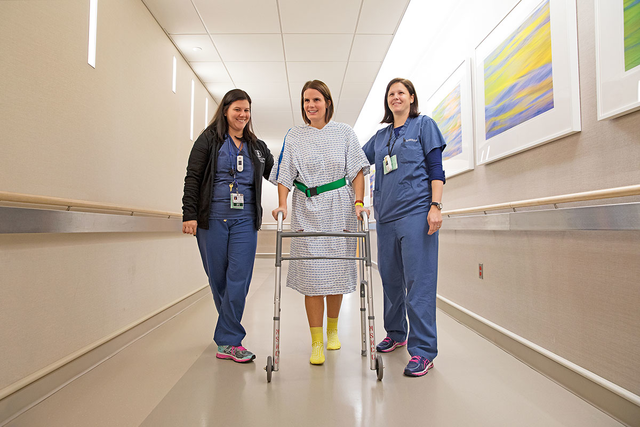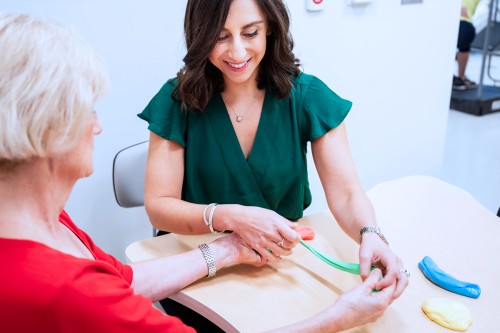
"Anything somebody takes for granted, chances are we teach it," says MSK occupational therapist Nicole Kasven-Gonzalez (right, with fellow therapist Amanda Molnar).
Day-to-day tasks can feel insurmountable in the face of cancer and its treatment. But when people can get back to their daily activities, such as brushing their teeth or walking a few steps, it’s a big win. Those small but mighty rehabilitation skills are what occupational therapists teach.
“Occupational therapy is helping people get back to their everyday lives,” says Nicole Kasven-Gonzalez, Inpatient Occupational Therapy Manager at Memorial Sloan Kettering. In an interview, she spoke more about her role.
What is occupational therapy? How does it differ from physical therapy?
Occupational therapy focuses on the whole individual and meaningful activities. A physical therapist might teach you how to walk. An occupational therapist might teach you how to safely walk specifically from your bedroom to your bathroom, or how to get dressed so you can go to your job. We also address cognition, which may include memory and attention. This can mean making sure someone can manage their medications or complete their daily tasks. Anything somebody takes for granted, chances are we teach it.
What effect do cancer and its treatment have on a person’s ability to function daily?
Cancer affects the whole body. It can impair strength, balance, and range of motion. Even being overwhelmed can affect memory or concentration. For example, if a person has a list of questions to ask their doctor, they might not have the ability to process all of that information and ask what’s on their mind at the moment. People are also not stimulated in their everyday activities because they’re isolated in the hospital.
What are some ways that occupational therapists help people at MSK?
It depends on the individual. Someone being admitted for a bone marrow transplant, for example, is going to be isolated and not performing everyday life roles. We might teach them energy conservation techniques so they have the stamina to visit with family and friends later. If we assess that somebody is having memory trouble, we’ll provide strategies, such setting a smartphone reminder or keeping a list so they can keep up with tasks.
What kind of work is done at the hospital as opposed to outpatient care?
Occupational therapists treat people in the hospital who have had surgery, chemotherapy, or radiation. We also work with people who have general weakness or less endurance. We teach people such skills as how to get out of bed with less effort, how to get dressed after having surgery, and how to work on their memory so they can recall their doctor appointments or medications.
Sometimes with outpatient care, it’s more fine-tuning so people return to their life with more independence. This can involve creating strategies to help them care for their children or return to work. If they are back at work, it might mean modifying their workstation to prevent overuse injuries. We can also teach people cognitive techniques, such as time-management tools.
How did you become interested in occupational therapy, and what’s the training like?
I did a lot of volunteer work when I first started my career and realized occupational therapy looked at both the mind and body. A master’s or doctorate in occupational therapy is required, and we have to complete fieldwork, where you learn on the job. Typically, we have two 12-week fieldwork assignments. Then you have a board exam. When you pass that, you’re licensed. There is a wide variety of places occupational therapists can work: hospitals, home care, rehab facilities, schools, and more.
What’s the most challenging part of your job?
Sometimes a patient is really motivated to progress and it’s difficult for them to achieve their goals because of their medical status.
What’s been a recent success?
I was seeing an outpatient bone marrow transplant patient who was a professor. She was having a difficult time with her memory, and her goal was to get back to work. We worked on goals that were very specific and meaningful to her, such as composing emails. We broke it down into smaller steps so it was less intimidating to her. She voiced her appreciation to occupational therapy. I love when our staff has success stories about our patients.



